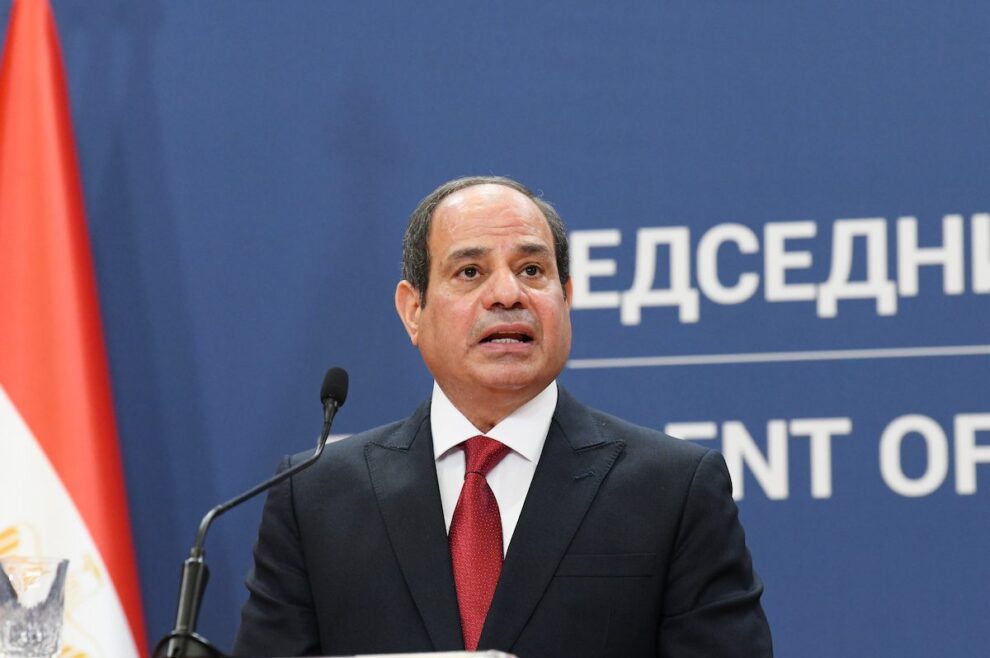With Middle East observers focused on the chances of normalization between Israel and Saudi Arabia, another more low-profile process of rapprochement appears to be underway in the region: this one between Egypt, Israel’s oldest regional peace partner, and Iran, Israel’s biggest foe.
The prospect of closer ties between the world’s most populous Shiite nation and the Sunni-majority Egypt after more than four decades of estrangement serves the interests of both countries, recent think tank reports suggest, and follows a trend of powerful Arab nations forging closer ties with Iran, partly in a bid to bring calm to a tumultuous region.
This time last year, the United Arab Emirates, a close ally of Egypt, returned its ambassador to Tehran after a six-year hiatus, and earlier this year Saudi Arabia, which has recently been in talks about warming ties with the United States, used Chinese mediators to reach an agreement with the Islamic republic to restore diplomatic relations after seven years.
Egypt is not quite there yet, say researchers and analysts, but there are some signs that it could soon follow in the footsteps of the UAE and Saudi Arabia.
A research paper published in June by the Institute for National Security Studies (INSS) at Tel Aviv University noted reports in recent months suggesting that the two countries are in the process of drafting a preliminary agreement that would establish, among other things, a joint committee to discuss restoring diplomatic relations and deepening coordination on security issues.
Iran’s supreme leader, Ali Khamenei, as well as senior Iranian officials, according to the INSS, have publicly expressed hope for the renewal of bilateral diplomatic ties, although Egypt remains relatively silent on the matter.
“The renewal of diplomatic relations accompanied by the exchange of ambassadors between Egypt and Iran still remains uncertain,” Ofir Winter, a senior researcher at the INSS and the co-author of the report, told Jewish Insider.
“Egypt’s approach towards normalizing ties with Iran continues to be marked by caution and skepticism, as Cairo aims to ascertain whether the recent rapprochement between Tehran and Arab states truly signifies a significant shift in Iran’s behavior within the region,” he explained.
Winter said that normalization between Egypt and Iran hinged on two key factors: the success of the Saudi-Iranian efforts toward normalization, and the position of the U.S., a key ally for Egypt.
“The Saudi-Iranian normalization agreement is perceived as a litmus test for evaluating the authenticity and dependability of Iran’s altered regional policies, particularly concerning its detrimental involvement in Lebanon, Yemen and Syria,” added Winter. “The outcome of this trial will dictate the feasibility of a broader and more profound rapprochement between Egypt and Iran.”
In addition, he continued: “Egypt is likely to proceed with the process of normalizing its relations with Iran only after ensuring that such a move would not jeopardize its relationship with the United States.”
Winter said that this consideration was especially pertinent given the economic crisis in Egypt, which relies heavily on financial aid from the United States, as well as Washington’s backing of international financial institutions such as the International Monetary Fund.
Professor Moshe Ma’oz, a senior research fellow at the Truman Institute at Hebrew University, said that the apparent change in diplomatic strategy in Egypt, which is the most populous Arab state, is likely just “maneuvering between the powers.”
“We still don’t know how it’s going to end, but by and large, Egypt is more in the U.S. camp than the Iranian camp,” he said. “Egypt is still very much connected to the United States but is trying to squeeze more concessions from them.”
Ma’oz added that while Egypt has certainly been influenced by “the very significant step taken by Saudi Arabia in signing an agreement with Iran, it is more neutral than Saudi Arabia and the other states.”
“Egypt is far away from the countries in the Gulf like Saudi Arabia, Kuwait, Qatar and others that have grown closer to Iran,” he explained. “In all of these countries, you also have sizable Shia communities, and they are loyal to Iran.”
A research paper published last month by the Middle East Institute lays out why Egypt might be interested in improving, or at least stabilizing, its ties with Iran, as well as with Qatar and Turkey – two other countries with which it has had strained relations in the past.
First and centrally are Egypt’s internal economic woes. “For years, the country has faced a financial crisis aggravated by inflation, substantial foreign debt, and a foreign currency shortage,” noted the report’s author, Amr Salah Mohamed. “Domestically, this has led to soaring prices for goods and services, putting the Egyptian government under pressure from social discontent.”
Mohamed also outlined Egypt’s goal of becoming a regional natural gas hub – in 2022 Israel signed an agreement with Egypt to provide Liquefied Natural Gas (LNG) to Europe – as well as the ongoing conflicts right on its doorstep: Libya, Sudan and Somalia, where increasingly Iran has influence. Egypt is also looking to reap the economic benefits of helping to rebuild post-conflict countries such as Iraq and Syria, which also fall into Iran’s sphere of influence, the report highlighted.
Another area that makes Iran an attractive ally for Egypt is in the realm of security, particularly in areas such as the Red Sea and the Sinai Peninsula, which have struggled with insurgency and terrorism, and also mediating a resolution to its ongoing dispute with Ethiopia over the Grand Ethiopian Renaissance Dam.
According to the Middle East Institute, “Egypt’s traditional partners, such as the UAE, the U.S., and Russia, have not shown enough muscle to pressure Ethiopia to reach a deal.” In his report, Mohamed pointed out: “The potential assistance of influential actors in the Horn of Africa, including Turkey and Iran, could help. Both countries have strong ties with the Ethiopian government.”
“Egypt is following the lead of its patrons, Saudi Arabia and the UAE,” observed Jonathan Schanzer, senior vice president for research at the Foundation for the Defense of Democracies, a Washington-based think tank. “Both countries have recently made overtures toward Iran and both countries also feel spurned by Biden administration foreign policy.”
“The Biden White House has done little to curb Iran’s regional aspirations for hegemony. So the region is hedging,” he told JI. “To compound the problem, Democrats in Congress have put a target on the regime of [Egyptian President Abdel Fattah] El-Sisi. Some of this is warranted, of course – the deficit of democracy and human rights in Egypt is a real problem – but with no end in sight to the blistering criticism and no promise of American support in the medium or long term, Egypt has little choice but to hedge.”
Schanzer added that Egypt has effectively been given little choice but to look toward Russia and Iran for assistance.
“There is a saying, ‘As Egypt goes, so goes the Middle East,’” he said. “Of course, Egypt has lost much of its influence in recent years and is no longer the political capital of the Arab world, but its rupture with the U.S. could still impact the political climate across the region.”
“The reinforcement of Arab-Iranian ties, including those involving Egypt and Iran, brings forth specific challenges for Israel,” Winter said. “Such developments could potentially help Iran alleviate its regional isolation, amplify its influence within the region and conceivably undermine the collective regional stance against Iran.”
In Israel, which signed a peace agreement with Egypt in 1979 and cooperates closely with its neighbor in the areas of security and energy, the prospect of it having warmer ties with Iran is not yet cause for concern, those interviewed by JI said.
“From the perspective of Israel, the normalization process between Egypt and Iran isn’t a strictly [a] zero-sum equation,” INSS’ Winter explained. “The improved rapport between these nations need not necessarily come at the detriment of Israel-Egypt relations or jeopardize essential Israeli interests.”
However, he suggested, “Jerusalem ought to start conducting an objective assessment of the unfolding scenario, considering its distinct parameters.”
“Israel shares common objectives with Egypt, such as fostering collaboration within the Eastern Mediterranean’s gas sector, diminishing the sway of Islamic Jihad and Hamas in the Gaza Strip and mitigating the menace of terrorism stemming from Iran and its regional proxies,” Winter explained.
“The reinforcement of Arab-Iranian ties, including those involving Egypt and Iran, brings forth specific challenges for Israel,” he said. “Such developments could potentially help Iran alleviate its regional isolation, amplify its influence within the region and conceivably undermine the collective regional stance against Iran.”
The Truman Institute’s Ma’oz also said he believed Israel was not overly concerned about the possible Egyptian-Iranian diplomatic realignment and highlighted that under the current Israeli government, relations with Egypt were unlikely to change for the better.
“Israel is satisfied with keeping its relations with Egypt the way they are,” he said. “That means having a security and energy cooperation but not full reconciliation because of the Palestinian issue.”
Ma’oz noted that despite the governmental and security ties between the two countries, it was still a cool peace and, he highlighted, that Egypt has purposely held back from joining the momentum of the Abraham Accords due to the pro-Palestinian sentiment in the country.
“Israel under this government is not interested in addressing the Palestinian issue,” he said, explaining that Egypt, as well as Jordan, which also has a peace treaty with Israel, “are still interested in adopting the Saudi Peace Initiative, which speaks about the creation of a Palestinian state with East Jerusalem as its capital and other issues.”
“The current [Israeli] government is not going to do this,” reasoned Ma’oz. “They are quite satisfied with the current relationship of peace without full reconciliation.”
Source : Jewish Insider











